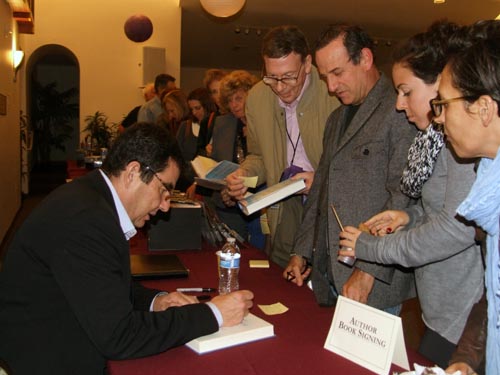
By Donald H. Harrison

 ENCINITAS, California—Ari Shavit, the Ha’aretz columnist who seeks a new narrative for Israel in his book My Promised Land, has called on Israel to engage in a “Marshall Plan” for the Gaza Strip, while at the same time dealing with Hamas “very strictly.”
ENCINITAS, California—Ari Shavit, the Ha’aretz columnist who seeks a new narrative for Israel in his book My Promised Land, has called on Israel to engage in a “Marshall Plan” for the Gaza Strip, while at the same time dealing with Hamas “very strictly.”
The Marshall Plan, named for U.S. Secretary of State George C. Marshall, helped rebuild the economies of the European nations after the devastation of World War II.
Besides offering hope and economic opportunity for Gazans, a Marshall Plan would help Israel reassert its identity and that of the Jewish people as a light onto the nations, demonstrating to the world that Jewish people “have morality in our veins,” Shavit asserted.
Shavit did not elaborate on what “very strictly” means in the context of Israel’s relations with Hamas during his generally well-received speech before a crowd that on Monday, Nov. 11, filled Temple Solel’s sanctuary and spilled over into the adjoining social hall, where his book and those of other speakers were offered for sale.
The author called for conciliatory gestures to Arabs living in Judea and Samaria, saying Israel should draw a line beyond which no Israeli settlement will be built, and should demonstrate its good faith by building cities for Arabs.
He said it is important to tread lightly in Jerusalem, especially around the hilltop that houses the Dome of the Rock and in biblical times was the site of the First and Second Temples. He described that hilltop metaphorically as a “nuclear reactor” which could result in another “Chernobyl”
The columnist warned against making any deal with Iran that could result in that country obtaining nuclear weapons. “If Iran goes nuclear, the Middle East will go nuclear,” he said, in apparent agreement with other commentators who say that in the event Shiite-dominated Iran obtains nuclear weapons such Sunni-majority countries as Egypt, Saudi Arabia and the United Arab Emirates will spare no expense to obtain their own nuclear weapons.
Referring to ISIS and other terror organizations throughout the Arab world, Shavit warned: “Look at all this chaos we have now and inject nuclear into it.”
He said the chaos engender by nuclear confrontations in the Middle East would quickly spread to the Western Hemisphere, warning, “the next 9-11’s will not be conventional 9-11’s.”
Shavit also argued that the U.S. should not be perceived as being aligned with Shiites against the Sunnis, who constitute approximately 85 percent of the Muslim world.
To deal with ISIS, he said, the U.S. should closely ally itself with the “moderate Muslims” – he identified Egypt and Saudi Arabia as being among them — notwithstanding the fact that the leaders of those two countries “are not ACLU people.”
Shavit described a major pattern of thought in his book as being that on the “seventh day of the Six-Day War” of 1967 Israel began to lose its moral compass, hidden perhaps, under the mountain of the problems caused by having to police another people living in territories that previously had been administered by Egypt in the case of Gaza; by Jordan in the cases of Judea and Samaria; and Syria in the case of the Golan Heights.
The author suggested that occupation had a corrosive effect both on the Israeli spirit and how the tiny nation was perceived in the world. No longer was the country seen as moral and idealistic; instead it was seen by Arabs, the world at large, and even some of its own youth as an oppressor.
The hatred and opprobrium which Israel today suffers, in Shavit’s view, is one reason why many Israelis fear that their country may not have a future; that someday Jews may be forced once again to live in Diaspora.
Despite such pressure, or perhaps because of it, Israelis live “intensely,” Shavit said. “We are not gloomy, not pessimistic,” he said. “We are creative, innovative, sensual and sexual.”
Whereas the 1950’s kibbutz dream of Israel becoming an egalitarian, liberal, progressive and benign society has been shattered, Israel nevertheless remains a “robust society,” and an “inspired celebration of life,” the author said.
*
Harrison is editor of San Diego Jewish World. He may be contacted via donald.harrison@sdjewishworld.com
An excellent summary of what Shavit said in his address. Don, as always, is the consummate reporter,
sprinkling his article with many significant quotes to lend authenticity to the report. Thanks, Don, for
covering it so well.
I’m just half-way through Shavit’s book, which certainly makes for interesting and thought-provoking reading.
I haven’t yet reached his final conclusions, but thinking about his his analysis of Israel’s history and current situation is starting to keep me awake at night.